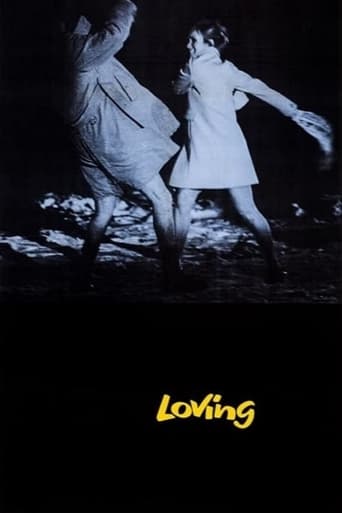JasparLamarCrabb
A frank, very adult look at a marriage on the verge of destruction. George Segal is a not so successful graphic artist married to very efficient homemaker Eva Marie Saint. He has his hands full with a wife, a girlfriend, two children, ambivalent clients, and very little money. Segal is exceptional in a role that is really perfect for his particular befuddled angst. Saint is every inch his equal, slowly realizing her husband's unhappiness, but not shy about letting him know the door is always open. Whether she actually will kick him out is debatable. The supporting cast includes David Doyle, Keenan Wynn, Roy Scheider and, briefly, Sterling Hayden. Directed with his usual sure hand by Irvin Kershner from a script by Don Devlin. The expert cinematography is by the great Gordon Willis.
lorelei3
I just finished watch this movie and it was one of the worst 1.5 hrs. I've spent in my life.Let me work backwards on this; when the final credits ran I was so confused by the abrupt ending that I had to rewind just to make sure that the movie didn't cut off the ending. It made no sense whatsoever. Immediately after the fight scene, the redhead just walks away. You'd think she would have said something and wouldn't it have been better if Brooks had seen her standing there?There is no relationship between the viewing audience and the actors, you end up not caring at all about the characters. Oh and don't let me forget the biggest mystery of them all, and this really kills me. The part where the guy goes into the room with the drunk girl -- you know he's going to take advantage of her but there are no repercussions and no one ever knows! Why did they put this in there if the hidden TV cam didn't even catch him?!?!?I beg of you all, don't watch this. The only reason I rated it a 4 rather than a 1 is because of the groovy 70's music and fashion.
moonspinner55
George Segal (not as scruffy as he typically had been at the start of the decade) plays a troubled husband and father suffering through career uncertainty who cheats on his wife (Eva Marie Saint, cast yet again as a doormat-spouse). Segal is an affable screen presence, but we never learn much about what makes him tick, what causes him to hurt the ones he loves. Talented director Irvin Kershner hit a few snags in his career; here, the semi-improvisational ground he's treading desperately needs a center, or a leading character we can attach some emotions to. The dramatic finale is well-realized, and Segal's comeuppance is provocative and thoughtful--at least something is HAPPENING; overall, it's a cynical slice of the marriage blahs, one that probably played a lot fresher in 1970 than it does today. ** from ****
Daniel Humphrey (saltsan)
In the great Jean Renoir classic "Rules of the Game", a character played by the director himself comments that "everybody has his own good reasons." This rightly has been taken to be the great humanist director's basic philosophy of life. Seeing, over and over again, this understanding, non-judgmental attitude by a narrative artist toward his characters' weaknesses is what makes art film audiences love Renoir's work and consider him one of the greatest filmmakers of the 20th century. Irvin Kershner's "Loving" is one of the rare Hollywood films worthy of being called Renoirian, and it is for just this reason. Even though "Loving" is filled with highly-flawed characters making seemingly disastrous choices about their lives, its genius is how it puts the audience in a position where it cannot (or at least cannot with any decency) judge them. This may be more than many audience members can handle, being so used to films with heroes and villains about whom they are allowed to feel smugly superior. The legendary "New Yorker" critic Pauline Kael, in her rave review of the film, wrote that it "looks at the failures of middle-class life without despising the people; it understands that they already despise themselves" and that there's "a decency in the way that Kershner is fair to everyone." We could use a few more films like "Loving" out there in the American film cannon. If you every get a chance to see this film, don't hesitate to do so!


